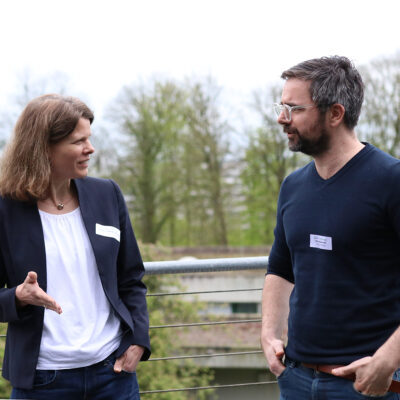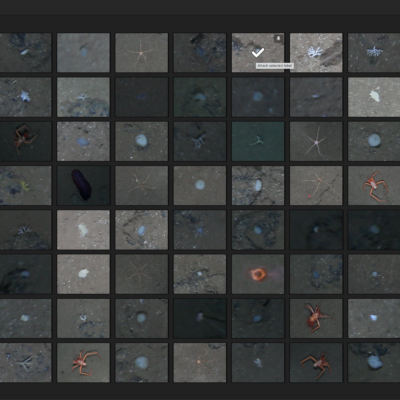The focus of the world’s largest conference on behavioural research, that took place from 14 to 20 August at Bielefeld University, is on animal behaviour—its changes and backgrounds. Over 800 registered participants, including top academics from a broad spectrum of fields—from ethology to behavioural genetics to anthropology—shared their research and areas of expertise at Behaviour 2023. The multidisciplinary and international congress is the biennial main conference of the International Council of Ethologists (IEC).
Can individualisation help animal species cope with climate change? And what kinds of selection pressures may actually improve the cognitive ability of a species? A variety of current issues were addressed during the congress in the 38 symposia and 56 general sessions scheduled: classic topics such as plasticity, social behaviour, and communication, but also emerging topics such as microbiome research, emotions in animals, and meta-analyses with large data sets. ‘We are delighted to be bringing together so many outstanding academics with their exciting research topics here at Behaviour 2023 in Bielefeld and are looking forward to the scientific exchange,’ said Professor Dr Oliver Krüger, head of Behavioural Research at the Bielefeld University’s Faculty of Biology. Krüger was spokesperson for the conference organising team together with Professor Dr Barbara Caspers.
Caspers also participated in the event as one of the plenary speakers. One of the topics of her lecture was the ability of zebra finches to recognise close relatives by smell. Other plenary speakers included the director of the Department for the Ecology of Animal Societies at the Max Planck Institute for Animal Behaviour and Alexander von Humboldt Professor at the University of Konstanz Dr Meg Crofoot, behavioural ecologist and conservation biologist Professor Stotra Chakrabarti PhD from Macalester College, Saint Paul (USA), Professor of biosciences Julia Saltz PhD from Rice University, Houston (USA), Professor of biology Michael Kasumovic PhD from the University of New South Wales in Sydney (Australia), and Professor of ethology Dr Melissa Bateson from the Centre for Behaviour and Evolution at Newcastle University (UK). The international experts provided insights into their research.
I want to understand why animals behave the way they do.
0:04
It’s like a sickness of scientists.
0:06
I can’t stop to be curious and motivated in finding out new things.
0:10
And it’s really like observing animals and finding out
0:13
why are they doing what we see them doing.
0:26
It is actually a historic building, although it doesn’t look like it.
0:30
It is the first department of animal behavior at any university in Germany.
0:35
It was founded on the 1st of November 1973,
0:38
and the first chair, Klaus Immelmann, made the department quite famous.
0:43
And hence, I believe this is indeed a historic place
0:46
and it is a wonderful place to work in because of the people who actually work here.
0:51
We study different facets of animal behavior
0:54
and we use different techniques, for example, machine learning,
0:58
but also molecular techniques to understand certain aspects of behavior.
1:03
And of course, in the long run, we hope to understand better
1:07
what is causing individual differences in behavior.
1:10
But we are also open
1:12
to all the new aspects that are hopefully coming in the future.
1:15
Behavior of animals is quite diverse,
1:17
and that’s why the research on this topic is also quite diverse.
1:21
We work with milligram heavy insects
1:24
and we see elephants that almost weigh a ton.
1:28
And as different as those animals are, are the behaviors we look at.
1:32
We do have such a variety of model systems.
1:35
In the lab we work with zebra finches and other estrildid finches.
1:41
Outside the university building,
1:43
There are the birds of prey.
1:44
So we work with goshawks, buzzards, eagle owls.
1:48
Even further afield we have long term field studies on Galapagos sea lions.
1:53
There is a long term project on Madagascar on different species of plovers.
1:57
So I think it’s the breadth and variety of model system
2:00
that really characterizes our approach to animal behavior.
2:04
For example, in the fire salamander research, where we are actually
2:08
currently looking at how much are these individuals moving in
2:11
their habitat and is there a difference between males and females?
2:15
Is there a difference between different individuals?
2:18
And in the long run, we really hope to understand
2:21
what is causing these differences.
2:36
In our department there is over 50 people.
2:38
So it’s a quite big department.
2:41
And in conjunction with Barbara Caspers and Klaus Reinhold,
2:45
there’s almost 90 people here studying all kinds of aspects
2:49
of the behavior ecology and evolutionary ecology
2:53
of a whole range of organisms, from insects to mammals and birds.
2:57
And I think that also makes this department unique,
2:59
that we have such a kind of big force of people interested in let’s say:
3:04
The over realm of animal behavior.
3:07
Whenever I tell anybody else that we help each other with money,
3:10
with space, with instruments, they usually have never heard of that.
3:15
And this is really perfectly done here in this building.
3:18
So there are many possibilities that people meet, chat often about science
3:23
or even work together from different groups,
3:26
and it doesn’t matter from which group they are.
3:28
We have an international team of scientists here
3:31
that have very different questions and that focus on different
3:35
animal species as well as different questions.
3:38
And that is something that is so inspiring on a daily routine
3:43
that I think there is no better place to work.
38 nations were represented at the Congress
The organisers, invited speakers, and participants came from 38 different countries. There were more than 600 talks and over 150 poster presentations. Besides the 38 symposia, there were also six workshops on the schedule, including sessions on topics such as inclusivity, diversity, and equality in biology. The organisers actively promoted the concepts of diversity and equality by providing childcare during the conference and adopting a code of conduct, which some members of the team have been trained to implement, in order to make the conference a safe space for everyone. Sustainability was reflected in all aspects of the organisation—including catering, mobility, and waste avoidance by using sustainable products.

© Bielefeld University/ M. Adamski
The congress programme for participants has been rounded off with excursions, for example to surrounding nature reserves. Various networking and social events were also planned for conference participants, for example on the topics of climate change and bioacoustics. By keeping conference fees comparatively low, the organisers wanted to enable as many academics of all career levels as possible, as well as students, to take part in the congress.
Public and free part of the congress
On Saturday, 19 August, interested people who are not attending the entire congress had the opportunity to learn more about behavioural research at a public session. Starting at 7 p.m., the German-language event took place in the large lecture hall Y-O-111 in the University’s Y-building. Dr. Isabelle Szott, behavioural researcher at apopo innovation, from Tanzania spoke on the topic of “Unexpected superheroes: how rats save lives!” and Professor Dr. Fritz Trillmich, behavioural researcher at Bielefeld University, on the topic “Always trouble with the family?” Registration for this public and free part of the congress is not required.
Other cities where this major conference has been held in the past include Newcastle (Great Britain), Cairns (Australia), Estoril (Portugal), and Chicago (USA). Bielefeld played host to the International Ethological Congress, as it was still called at the time, back in 1977, making it one of only two universities in the history of the IEC to succeed in holding the conference for a second time. Behaviour is staged every two years and is the main conference of the International Council of Ethologists. The conference is supported by various organisations, including the Association for the Study of Animal Behaviour (ASAB), the Ethological Society, and the European Society for Evolutionary Biology (ESEB). These organisations run conferences and award scholarships to academics and students.

© Bielefeld University/M. Adamski
Behavioural Research at Bielefeld University’s Faculty of Biology
The chair of Behavioural Research at the Faculty of Biology comprises a team of more than 50 academics. They study animal behaviour in the context of Nikolaas Tinbergen’s four-question theory. Bielefeld’s behavioural research is currently known for its laboratory studies on zebra finches and wild guinea pigs, as well as its long-term field studies on birds of prey such as the buzzard and the goshawk, or research on seal species such as the Galapagos sea lion and the Antarctic fur seal. Under Professor Dr Klaus Immelmann, the chair, which was founded on 1 November 1973, has developed into a leading international centre for behavioural research. Professor Dr Oliver Krüger has headed the chair since 2013. In 2020, the field of behavioural ecology was launched and headed by Professor Dr Barbara Caspers, further strengthening the diversity of research topics at Bielefeld University. A current major project is the Collaborative Research Centre/Transregio ‘A Novel Synthesis of Individualisation across Behaviour, Ecology and Evolution: Niche Choice, Niche Conformance, Niche Construction (NC³)” (CRC/TRR 212), which was founded in 2018 by Bielefeld University and the University of Münster and is funded by the German Research Foundation (DFG). The research network ‘Individualisation in Changing Environments’ (InChangE) has been running since 2021 in cooperation with the University of Münster. It is funded by the North Rhine-Westphalia Ministry of Culture and Science.





